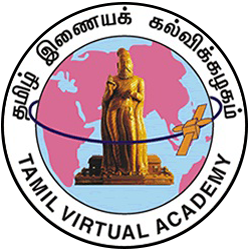Primary tabs
-
D01123 Lesson 3 Aingurunuru-3
This lesson defines and analyses the two types of ‘Kaikolgal’ in ‘Aingurunuru’. ‘Kaikol’ is the codification of the behaviour or morality pertaining to romantic love. There are 2 types of ‘Kaikolgal’. They are ‘Kalavu’ and ‘Karpu’. ‘Kalavu’ signifies the clandestine meeting of lovers before marriage. ‘Karpu’ is love in the context of married life. This lesson offers a bird’s eye view of the verses in ‘Aingurunuru’ concerning the various aspects of love in the context of ‘kalavu’ and ‘karpu’.The important aspects of ‘Kalavu’ are: ‘Paal’ or ‘Oozh’, ‘Iyarkai Punarchi’, ‘Idanthalaippaadu’, ‘Paangar Kootam’ and ‘Paangiyir Kootam’. There are songs based on these aspects in ‘Aingurunuru’. ‘Paal allathu Oozh’ signifies the belief that the thalaivan i.e., (the lover) and the thalaivi i.e., (the beloved) meet by divine ordinance or the power of fate. ‘Iyarkai Punarchi’ is the spontaneous or natural union of the lovers who happen to meet by chance without anyone’s intervention. The lovers happen to meet each other in a place. The subsequent clandestine meeting of the lovers in the same place is called ‘Idanthalaippaadu’. The friends of the thalaivan and the thalaivi in ‘kalavu’ are called ‘Paangar Kootam’ and ‘Paangiyir Kootam’ respectively. These friends play an important role in the lives of the thalaivan and the thalaivi. They not only act as messengers between the lovers and arrange their meeting, but also counsel them on the right conduct in ‘kalavu’. Other than the paangi or the thozhi, the ‘Sevili’ who is the foster mother of the thalaivi, the ‘Nattrai’ who is the mother and ‘Kandor’ - those who have seen the thalaivan and the thalaivi together also help and advise the lovers. The lesson illustrates these various aspects of ‘Kalavu’ with appropriate verses from ‘Aingururunuru’.
‘Karpu’ is love in the context of married life. ‘Kalavu’ ends in marriage or ‘Thirumanam’. However, marriage may sometimes not be the outcome of ‘Kalavu’. It may also be arranged by the parents. Thus marriage is classified as ‘Kalavu Vazhi Thirumanam’ i.e., (marriage through love) and ‘Kalavu Vazhi Vaara Thirumanam’ i.e., (marriage arranged by parents). There are several songs in ‘Aingurunuru’ that celebrate love in married life.
‘Pirivu’ or the separation of the husband and wife is one of the predominant themes in the ‘Aingurunuru’ songs that pertain to karpu. In the context of karpu, separation results from a variety of factors. The thalaivan visits the courtesan or goes on a journey in pursuit of education or wealth. He undertakes a journey to safeguard his kingdom or goes as an official ambassador to neighbouring kingdoms. The quarrelling lovers are usually reconciled through the intervention of their friends’ viz. (pangan and pangiar).


